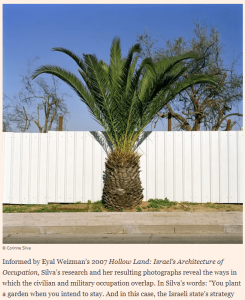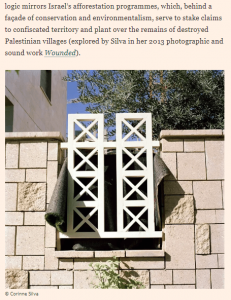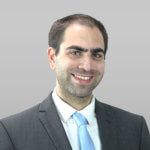2019 may have only just begun but already we have a strong contender for the most ridiculous anti-Israel article of the year.
Although the Financial Times sells itself as a reliable source of information, a recent piece left the HonestReporting team astounded. An article by academic Shela Sheikh entitled “Corinne Silva: Plants, Power and the Israeli State” attacks Israeli shrubs and trees for “erasing memory” of other peoples.
Yes, plants.
While there certainly is value in researching how plants and infrastructure affect the public sphere and a society’s social fabric, the depth of analysis on Israeli plants and gardens reveals quite a lot more about the researcher’s and writer’s state of mind than it does anything else. For the more academically-inclined among us, we found it useful to periodically remind ourselves – this article is about gardens. Not guns or tanks, not fences or walls, but gardens.

Join the fight for Israel’s fair coverage in the news
Sheikh focuses on a series of photographs taken by Corinne Silva examining “the inherent links between cultivation and colonisation.” The piece is dotted with bland photographs of typical suburban scenes – nondescript white fences, stubby trees, and the irrigation tubes that are ubiquitous in Israel, literally bringing life to a desert land. Alas, all these are framed as being “designed with the aim of transplanting Israelis… on to land formerly populated by Palestinians.”
Of course, that’s one way of framing things. Another way would be to label these pictures of Israeli plants and trees as “utterly boring” and the fact that Israelis live in places such as Bet Shemesh or Beersheba – both internationally recognized as Israeli territory – is as direct a result of the Arabs rejecting a UN peace plan in 1947 and starting a war which ended with them in control of less territory than they had originally been offered.
Such facts, however, are irrelevant when the aim is to knock Israel by any means possible. Rather than accepting Israel’s right to win a war of self-defense, Sheikh unquestioningly presents Silva’s documentation of Israel’s forest-planting programs as evidence of serving “to stake claims to confiscated territory and plant over the remains of destroyed Palestinian villages.”

Not Impartial Reporting
A little digging reveals Sheikh to be far from an impartial writer. Her article notes that Silva’s exhibition was informed by a book written by Eyal Weizman. What the article does not say is that Weizman is the director of Forensic Architecture, a research agency based at Goldsmith’s University, London, where Sheikh teaches, or the fact that Shela herself was a researcher there previously.
Forensic Architecture claims to investigate “human rights violations, and communities in conflict zones or otherwise subject to state failure or violence.” A seemingly noble goal, but one which casually discards the need to research the human rights violations perpetrated by non-state actors, such as terrorist groups. This is the research agency behind the front-page revelation in the New York Times less than a month ago that a Palestinian medic was killed by mistake after a bullet fragment tragically ricocheted into her, but nevertheless managed to suggest that her killing was perhaps not accidental.
Sheikh seems to have a real fixation on Israel. This, after all, is an individual who wrote the following sentence in her PhD thesis: “For perhaps it would be too quick to assume that all terrorism is deliberate or intentional.”
While there’s certainly plenty of room to discuss Israel’s policies, the relentless focusing on every aspect of Israel’s existence in the international media from all kinds of angles demonstrates why so many regard the media as fixated on the Jewish state. In that spirit we say: Leaf Israel alone.
Share this piece if you are tired of ridiculous attacks on Israel in the media.


